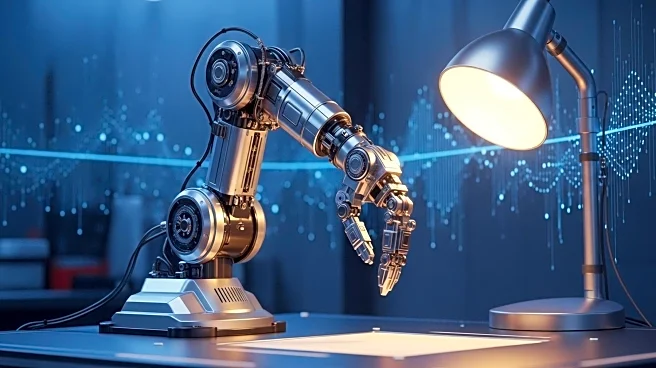What's Happening?
China is making significant strides in the field of embodied artificial intelligence, with X Square Robot emerging as a key player. The startup has attracted a $100 million investment from Alibaba Cloud, highlighting its potential in the humanoid robotics sector. X Square Robot is advancing open-source AI models, such as Wall-OSS, which are designed to enhance the capabilities of humanoid robots. These models are freely available on platforms like GitHub, promoting rapid innovation and accessibility. The global humanoid robot market is projected to grow significantly, with China positioned to lead due to its manufacturing capabilities and AI ambitions.
Why It's Important?
The investment in X Square Robot underscores China's strategic focus on integrating AI with physical systems, which could redefine industrial automation and aging population care. This move is part of a broader trend where major industries like automotive and logistics are increasingly adopting humanoid robots for various tasks. The open-source nature of X Square's AI models could democratize access to advanced robotics, fostering innovation across sectors. As China continues to lead in this area, it could set new standards for global industrial practices, impacting economic growth and technological development worldwide.
What's Next?
X Square Robot is preparing for an initial public offering in 2026, which could further accelerate its growth and attract international investors. The startup aims to expand its commercial applications beyond China, leveraging Alibaba's ecosystem approach to enhance its AI models. However, challenges such as high costs and technical limitations remain, which could affect the pace of adoption. Maintaining a cohesive developer community and ensuring compatibility with diverse hardware will be crucial for the success of X Square's open-source models.
Beyond the Headlines
The rise of embodied AI in China could have broader implications for global technology standards and ethical considerations in robotics. As open-source models become more prevalent, issues related to data privacy, security, and intellectual property may arise. Additionally, the integration of AI with physical systems could lead to shifts in labor markets, requiring new skills and training for workers. The long-term impact of these developments could reshape industries and societal norms, emphasizing the need for thoughtful regulation and policy-making.










